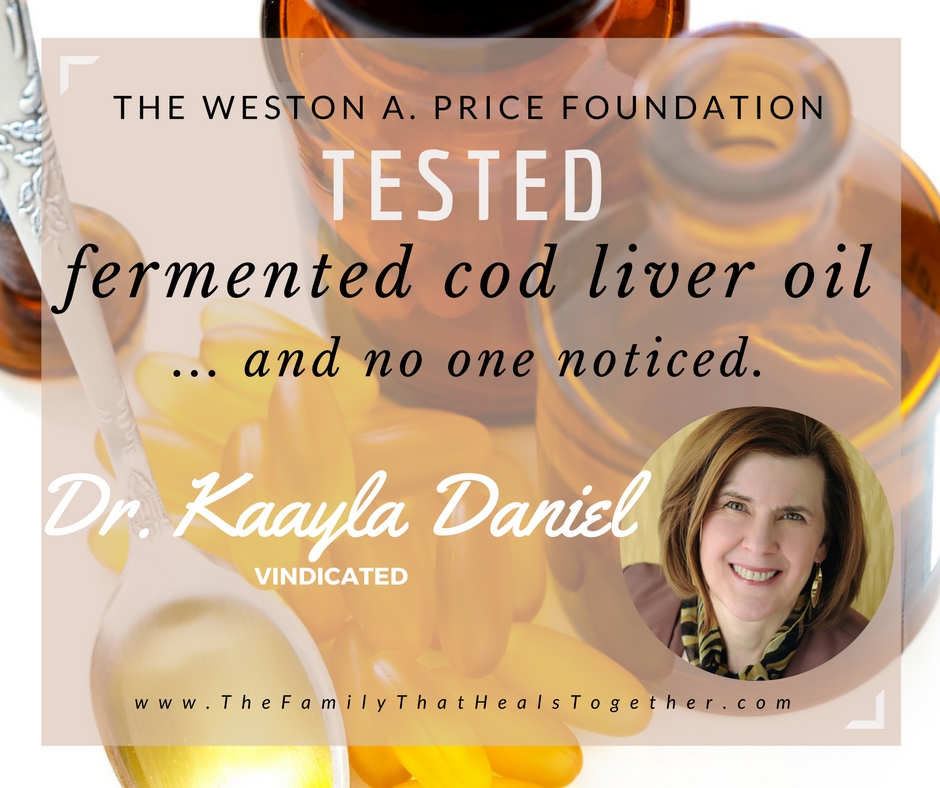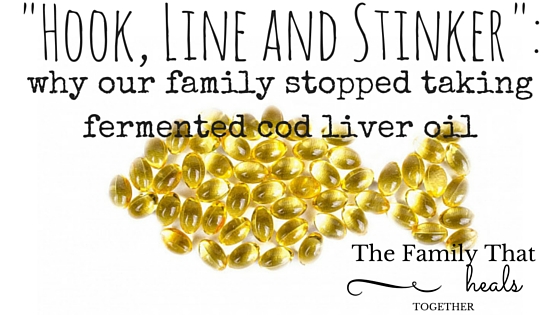Last year brought us cod liver oil-gate: we learned that fermented cod liver oil, the gold standard of healthy supplementation for families everywhere, was a fraud. I told you about why our family stopped taking it and what we take instead.
After Dr. Kaayla Daniel, then vice president of the Weston A. Price Foundation (WAPF), conducted independent studies of Green Pasture fermented cod liver oil, she published a report, detailing that not only was the fermented cod liver oil rancid, but it lacked the vitamin content that was being promoted.
The ensuing controversy left die-hard fermented cod liver oil fans grasping for the truth, and wondering what they should do next. Dr. Daniel was accused of lying and profiteering, and was, ultimately, fired from the foundation.
So why was Dr. Daniel willing to put her reputation on the line, losing her job, and creating enemies everywhere? I spoke with Dr. Daniel soon after she published her report “Hook, Line, and Stinker” and she told me, “I’m a mom, and that’s why I did this.”
Daniel had received complaints from many parents stating their children were having poor reactions to the fermented cod liver oil, which prompted her to investigate the health claims of the product. When she brought her concerns to WAPF, however, she was stonewalled, and the foundation refused to listen to her concerns or conduct independent testing on the fermented cod liver oil, instead relying on the reports from the company who manufactured the oil (Green Pasture).
In fact, WAPF had never independently tested any cod liver oils prior to 2015. Sally Fallon, president of WAPF says, “We have never tested products for endorsement, only looked at the ingredient list to see whether they fit into our guidelines. However, for the important product of cod liver oil, because of this controversy, I will now be recommending to the board that we develop a protocol for testing all brands for vitamin levels and markers of rancidity before we approve them.” (source, emphasis mine)
The only test results WAPF used to proclaim fermented cod liver oil contained high vitamin levels were the results posted on the Green Pasture website. These results showed that, in addition to very high vitamin levels, the bulk of the vitamin D was in the form of D2, a plant-based vitamin D found in mushrooms, and it contained very low levels of D3. Fish oils and cod liver oil do not contain plant-based vitamin D2, but animal-based D3.
Following the WAPF’s refusal to test fermented cod liver oil, Dr. Daniel decided to take matters into her own hands. That’s when things got interesting.
Dr. Daniel tests fermented cod liver oil
Dr. Daniel went underground, securing independent funding and paying an independent lab to test the oil. Though she was concerned about the oil, the results were worse than she anticipated: the oil had markers indicating rancidity, and the vitamin content was nowhere near what had been previously reported. (source)
Back in 2009, Green Pasture reported the vitamin content of their fermented cod liver oil was as follows: 9,500 IU vitamin A/ tsp and 1,950 IU vitamin D/ tsp. More recent testing has shown these numbers may be grossly inflated. These numbers are more than double the vitamin A and triple the vitamin D levels found in raw, extra virgin cod liver oil, another top-rated cod liver oil promoted by WAPF, which contains 3,500 to 4,500 IU/tsp of vitamin A and 350 to 450 IU/tsp of vitamin D.
Even if the fermentation process somehow increases the vitamin levels in fermented cod liver oil, research points to a lack of bioavailable vitamins in appropriate ratios.
WAPF tests fermented cod liver oil
In November of 2015, WAPF finally tested fermented cod liver oil. They used two different labs, Covance and UBE Labs. The Covance test results were in the same ball park as Dr. Daniel’s test results (only lower). According to Covance, fermented cod liver oil contained 3,125 IU/teaspoon of vitamin A and only 59 IU/teaspoon of vitamin D3. (source)
This figure is nowhere near the vitamin D2 value shown by UBE, which fits with Green Pasture’s original claim of a range of 1,500-5,000 IU/tsp.
The Weston A. Price Foundation’s own testing vindicated Dr. Kaayla Daniel and no one noticed. We heard crickets.
The test results from UBE Labs show that total vitamin A was still in the same range at 3,445 IU/teaspoon but the vitamin D was 1,645 IU/teaspoon, and all in the form of D2. (Note that UBE is the lab Green Pasture relied on for their original testing and subsequent vitamin content claims).
Interestingly, a report on vitamin D levels showing testing done on cod liver oil that has been “molecularly distilled with no added vitamins” (think refined, grocery-store cod liver oil), “unheated” cod liver oil (think extra virgin cod liver oil), and “fermented” cod liver oil (Green Pasture) displayed on the WAPF’s Web site is missing the values for vitamin D3 for the fermented cod liver oil. (Figure 4.) However, if you view the results of the testing done by Covance Lab, you will see that it actually shows a value of 59 IU/tsp. (source)
While WAPF continues to promote fermented cod liver oil as the best type of cod liver oil available, Sally Fallon says, “In general, results from UBE were considerably higher than those for Covance… it is likely that the form of vitamin D identified as D2 by UBE labs is another, as yet unidentified, form of vitamin D. UBE Labs says that they do a very thorough job of releasing or extracting the vitamin D, and that is why they get high results. Unfortunately, they will not share their methodology with us, so we (WAPF) have not published any of their results in our journal.” (source 1, 2)
WAPF will not publish UBE’s results in their journal, yet these are still the results they use to promote exorbitantly high vitamin levels in fermented cod liver oil. Note that Green Pasture pulled the test results from their website a year ago and post no vitamin A and D levels on their bottle labels.
Mystery D
Additionally, while the foundation no longer believes that fermented cod liver oil contains D2, they continue to rely on these high vitamin D levels based on the idea that there is a “mystery” vitamin D that is being detected. If this “mystery” D is really the vitamin D we should be after, why all the charades? Why not just come clean and be up front about the fact that fermented cod liver oil has no appreciable levels of vitamin D3, the type of vitamin D one would expect to find in cod liver oil?
To date, Fallon states “…the forms of D in cod liver oil are not D2 but other metabolites. We hope to solve this mystery with further research.” She goes on to say that there are “hundreds of vitamin D metabolites” so we are to accept that it isn’t important which type of vitamin D is present, just that it’s there. (source)
The reason most of us take cod liver oil is to obtain vitamin D3, the same form of vitamin D that our bodies make when our skin is exposed to sunlight. I’m not interested in a mystery vitamin D, just vitamin D3, which is strangely absent in fermented cod liver oil.
A to D ratio
The problem with assuming that fermented cod liver oil is chock-full of vitamin D, is that it is also chock-full of vitamin A, which can easily become toxic in the wrong ratio. To keep vitamin A in check, it needs to be combined with vitamin D3 at a ratio of approximately 10:1 (ten times more vitamin A than vitamin D3). According to the Covance lab test of fermented cod liver oil, the ratio of A:D is approximately 53:1 which is much higher than the 5:1 ratio for fermented cod liver oil stated on the foundation website (and much higher than the 10:1 ratio that is expected in cod liver oil).
The foundation states, “It is important to AVOID cod liver oil that contains low levels of vitamin D in relationship to vitamin A. The ratio of D to A should be AT LEAST 1 to 10.” The foundation recommends that the ratio of A to D should not be greater than 10:1 (for every one unit of vitamin D there should be no more than 10 units of vitamin A). (source)
Fermented cod liver oil and vitamin D deficiency
If fermented cod liver oil really does contain all this fabulous vitamin D (whatever type it may be), why are so many users (myself included) still vitamin D deficient?
As I wrote about last year, blood tests showed that both my son and I were vitamin D deficient, after years of faithfully taking fermented cod liver oil. I was flabbergasted. Not only had I spent a small fortune on this oil that was supposed to bolster my immune system and keep me healthy, but I was suffering from the very ailments it was supposed to alleviate and prevent: vitamin D deficiency and poor immune function. My son had the same problems.
It turns out, I wasn’t alone, and Sally Fallon admits that others have reported similar problems. She says, “Obviously the product does not have the same effect on all people. Again, this is an interesting question and one that we hope to look into.” (source)
Fallon also notes, “This does not mean we do not recommend that some individuals have their vitamin D levels tested. Such testing can be very useful in determining vitamin D status and the effectiveness of cod liver oil or vitamin D supplements.” (source)
If we’re taking cod liver oil that contains 1,645 IU/tsp of vitamin D, how the heck are we deficient?
The simple answer: fermented cod liver oil cannot possibly contain such high levels of vitamin D. Whether or not it contains vitamin D2 or some other, unnamed D vitamin, it is clear that fermented cod liver oil is lacking vitamin D3, the accepted form of vitamin D that strengthens the immune system and raises blood levels of vitamin D.
Indeed, one study concludes, “In humans, vitamin D3 is more effective than vitamin D2 at raising serum 25(OH)D concentrations.” (source)
Did you buy into fermented cod liver oil, hook, line, and stinker?
I did. And, once I learned the truth, our family stopped taking it. We now rely on extra-virgin cod liver oil, a choice I feel good about, and another that the WAPF endorses.
I’m not sure why the WAPF has not been more transparent about this matter, but as a mom who has worked hard to heal a very sensitive child, I am very careful about what I give my family, and when there is this much misinformation and controversy surrounding a product, I simply cannot trust it.








